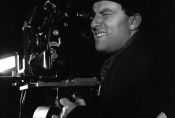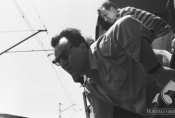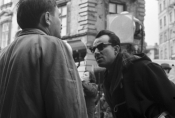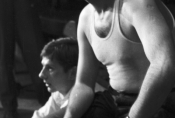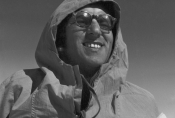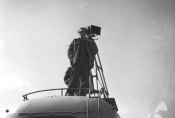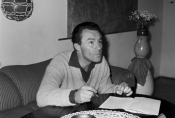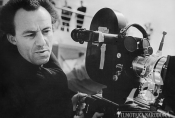Andrzej Munk
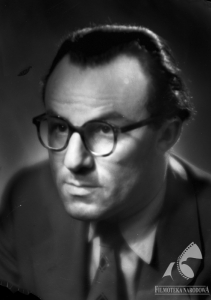
Director, screenwriter and cinematographer. He was born on October 16, 1921, in Krakow. In June 1939, he graduated from Krakow’s 8th National Secondary School of Mathematics and Natural Sciences. During the September campaign, he fought in Silesia. In March 1940, he moved to Warsaw, where the Munk family had to hide during the German occupation because of their Jewish roots. In the years 1943-1944, he fought in the Home Army and Military Organisation of the Polish Socialist Party. He took part in the Warsaw Uprising. After it ended, he escaped in a transport to a transit camp in Pruszków and returned to Kraków. He was hiding in Zakopane until the liberation. In September 1945, he returned to Warsaw. In 1946, he joined the Polish Socialist Party and the Union of Independent Socialist Youth. He married Halszka (Joanna) Próchnik, daughter of Adam Próchnik, a socialist activist. He enrolled at the Faculty of Architecture of the Warsaw University of Technology, and – in 1947 – the Law Faculty at the University of Warsaw. He had to leave university to treat his tuberculosis which he contracted during the war. He had been interested in amateur photography since before the war, so, in 1948, he enrolled at the Film School in Łódź in order to escape the political repression awaiting him in Warsaw. In 1951, he graduated from the Cinematography Department and received a diploma from the Directing Department. The Polish Communist Party and communist authorities saw him as an "ideologically foreign element", and as such, he was observed by the security service. In 1952, a minor incident of moral nature was used as an excuse to expel the director from the communist Party.
In 1950, Munk was hired in the Warsaw Documentary Film Studio, where he debuted as a director with Sztuka młodych/Young Art (1950). He shot 15 editions of the Polish Film Chronicle (1950-1951) as well as a number of propaganda films, including Kolejarskie słowo/A Railwayman’s Word (1953) and Gwiazdy muszą płonąć/Stars Must Burn (1954). It was there that he made his first colour film Niedzielny poranek/Sunday Morning (1955) and a fictionalised documentary Błękitny Krzyż/Blue Cross (1955). Even after leaving the Film Studio (1955), he filmed his beautiful, colourful and poetic impression Spacerek staromiejski/A Walk in the Old Town (1958) and Wydanie (anty) jubileuszowe PKF/The (anti)Anniversary Edition of the Polish Film Chronicle (1959) in this studio, on the 15th anniversary of the Chronicle.
Munk’s full-length feature film debut was Człowiek na torze/Man on the Tracks (1956), the first anti-Stalinist film in Central and Eastern Europe, one of the harbingers of the Polish Film School. Człowiek na torze/Man on the Tracks and Munk’s two subsequent films regarded as the greatest achievements of the Polish School – Eroica (1957) and Zezowate szczęście/Bad Luck (1960) – were adaptations of prose by an outstanding writer and leading writer of the Polish School, Jerzy Stefan Stawiński. The films were made in the "Kadr" Film Studio, the “forge” of the Polish Film School.
On September 20, 1961, during the filming of Pasażerka/Passenger (1961-1963), Andrzej Munk died in a car accident between Sochaczew and Łowicz. The premiere of Pasażerka/Passenger (edited and completed by Witold Lesiewicz using the material shot by Munk combined with film stills) was held on September 20, 1963, on the second anniversary of the director’s tragic death.
In the years 1959-1961, Andrzej Munk made three Television Theatre spectacles (including Pasażerka/Passenger). In 1960, he directed The Apple Cart by George Bernard Shaw at the Polish Theatre in Warsaw. In the years 1957-1961, he taught at the Directing Department of the Film School in Łódź. His students were Roman Polanski, Jerzy Skolimowski and Krzysztof Zanussi. Four of Munk’s feature films won the Warsaw Mermaid, awarded by the Film Critics Club of the Association of Polish Journalists. Człowiek na torze/Man on the Tracks won the Crystal Globe for Best Director at the International Film Festival in Karlovy Vary (1957). Eroica earned him the FIPRESCI award at the International Film Festival in Mar del Plata (1959). For Zezowate szczęście/Bad Luck, he received a Diploma of Recognition at the Edinburgh International Film Festival (1960). Pasażerka/Passenger won the FIPRESCI award at the Cannes Film Festival (1964) and the Award of the Association of Italian Film Journalists at the Venice Film Festival (1964).
Andrzej Munk was buried in the Alley of the Meritorious in Powązki Cemetery in Warsaw.
Andrzej Bukowiecki
Selected filmography
-
1956
MAN ON THE TRACKS
-
1957
HEROISM (EROICA)
-
1960
BAD LUCK
-
1963
THE PASSENGER
Articles
-
“Bad Luck” or The Scissors by Andrzej Munk
Mariola Dopartowa
50 Years of Polish Film School, Warsaw 2008
-
The Structures of Memory
Paulina Kwiatkowska
„Kwartalnik Filmowy” – Special Issue 2013: “Polish Film Scholars on Polish Cinema”
-
Bodiless Enemy
Rafał Marszałek
„Kwartalnik Filmowy” – Special Issue 2013: “Polish Film Scholars on Polish Cinema”
